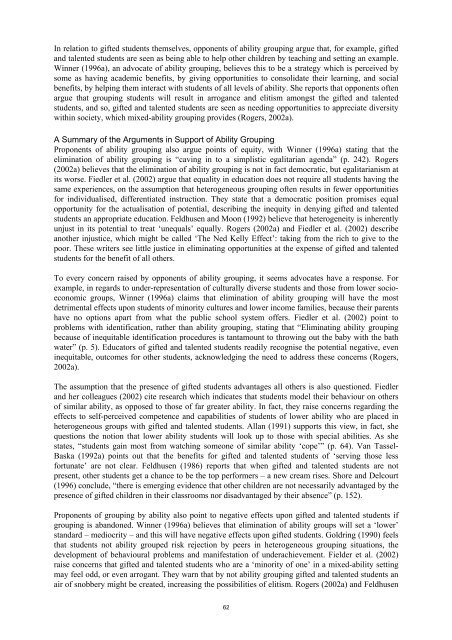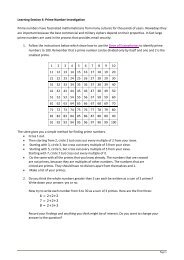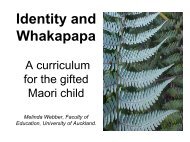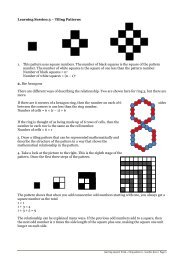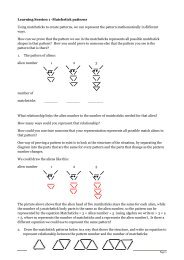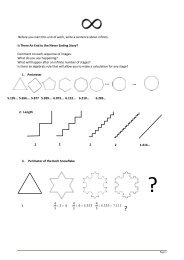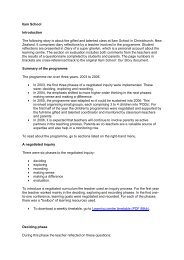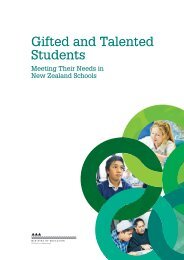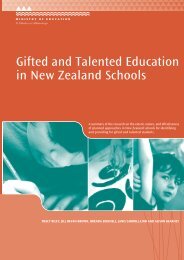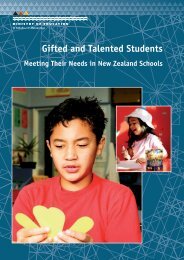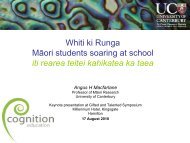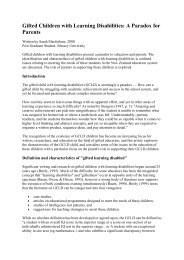The Extent, Nature and Effectiveness of Planned Approaches in ...
The Extent, Nature and Effectiveness of Planned Approaches in ...
The Extent, Nature and Effectiveness of Planned Approaches in ...
Create successful ePaper yourself
Turn your PDF publications into a flip-book with our unique Google optimized e-Paper software.
In relation to gifted students themselves, opponents <strong>of</strong> ability group<strong>in</strong>g argue that, for example, gifted<strong>and</strong> talented students are seen as be<strong>in</strong>g able to help other children by teach<strong>in</strong>g <strong>and</strong> sett<strong>in</strong>g an example.W<strong>in</strong>ner (1996a), an advocate <strong>of</strong> ability group<strong>in</strong>g, believes this to be a strategy which is perceived bysome as hav<strong>in</strong>g academic benefits, by giv<strong>in</strong>g opportunities to consolidate their learn<strong>in</strong>g, <strong>and</strong> socialbenefits, by help<strong>in</strong>g them <strong>in</strong>teract with students <strong>of</strong> all levels <strong>of</strong> ability. She reports that opponents <strong>of</strong>tenargue that group<strong>in</strong>g students will result <strong>in</strong> arrogance <strong>and</strong> elitism amongst the gifted <strong>and</strong> talentedstudents, <strong>and</strong> so, gifted <strong>and</strong> talented students are seen as need<strong>in</strong>g opportunities to appreciate diversitywith<strong>in</strong> society, which mixed-ability group<strong>in</strong>g provides (Rogers, 2002a).A Summary <strong>of</strong> the Arguments <strong>in</strong> Support <strong>of</strong> Ability Group<strong>in</strong>gProponents <strong>of</strong> ability group<strong>in</strong>g also argue po<strong>in</strong>ts <strong>of</strong> equity, with W<strong>in</strong>ner (1996a) stat<strong>in</strong>g that theelim<strong>in</strong>ation <strong>of</strong> ability group<strong>in</strong>g is “cav<strong>in</strong>g <strong>in</strong> to a simplistic egalitarian agenda” (p. 242). Rogers(2002a) believes that the elim<strong>in</strong>ation <strong>of</strong> ability group<strong>in</strong>g is not <strong>in</strong> fact democratic, but egalitarianism atits worse. Fiedler et al. (2002) argue that equality <strong>in</strong> education does not require all students hav<strong>in</strong>g thesame experiences, on the assumption that heterogeneous group<strong>in</strong>g <strong>of</strong>ten results <strong>in</strong> fewer opportunitiesfor <strong>in</strong>dividualised, differentiated <strong>in</strong>struction. <strong>The</strong>y state that a democratic position promises equalopportunity for the actualisation <strong>of</strong> potential, describ<strong>in</strong>g the <strong>in</strong>equity <strong>in</strong> deny<strong>in</strong>g gifted <strong>and</strong> talentedstudents an appropriate education. Feldhusen <strong>and</strong> Moon (1992) believe that heterogeneity is <strong>in</strong>herentlyunjust <strong>in</strong> its potential to treat ‘unequals’ equally. Rogers (2002a) <strong>and</strong> Fiedler et al. (2002) describeanother <strong>in</strong>justice, which might be called ‘<strong>The</strong> Ned Kelly Effect’: tak<strong>in</strong>g from the rich to give to thepoor. <strong>The</strong>se writers see little justice <strong>in</strong> elim<strong>in</strong>at<strong>in</strong>g opportunities at the expense <strong>of</strong> gifted <strong>and</strong> talentedstudents for the benefit <strong>of</strong> all others.To every concern raised by opponents <strong>of</strong> ability group<strong>in</strong>g, it seems advocates have a response. Forexample, <strong>in</strong> regards to under-representation <strong>of</strong> culturally diverse students <strong>and</strong> those from lower socioeconomicgroups, W<strong>in</strong>ner (1996a) claims that elim<strong>in</strong>ation <strong>of</strong> ability group<strong>in</strong>g will have the mostdetrimental effects upon students <strong>of</strong> m<strong>in</strong>ority cultures <strong>and</strong> lower <strong>in</strong>come families, because their parentshave no options apart from what the public school system <strong>of</strong>fers. Fiedler et al. (2002) po<strong>in</strong>t toproblems with identification, rather than ability group<strong>in</strong>g, stat<strong>in</strong>g that “Elim<strong>in</strong>at<strong>in</strong>g ability group<strong>in</strong>gbecause <strong>of</strong> <strong>in</strong>equitable identification procedures is tantamount to throw<strong>in</strong>g out the baby with the bathwater” (p. 5). Educators <strong>of</strong> gifted <strong>and</strong> talented students readily recognise the potential negative, even<strong>in</strong>equitable, outcomes for other students, acknowledg<strong>in</strong>g the need to address these concerns (Rogers,2002a).<strong>The</strong> assumption that the presence <strong>of</strong> gifted students advantages all others is also questioned. Fiedler<strong>and</strong> her colleagues (2002) cite research which <strong>in</strong>dicates that students model their behaviour on others<strong>of</strong> similar ability, as opposed to those <strong>of</strong> far greater ability. In fact, they raise concerns regard<strong>in</strong>g theeffects to self-perceived competence <strong>and</strong> capabilities <strong>of</strong> students <strong>of</strong> lower ability who are placed <strong>in</strong>heterogeneous groups with gifted <strong>and</strong> talented students. Allan (1991) supports this view, <strong>in</strong> fact, shequestions the notion that lower ability students will look up to those with special abilities. As shestates, “students ga<strong>in</strong> most from watch<strong>in</strong>g someone <strong>of</strong> similar ability ‘cope’” (p. 64). Van Tassel-Baska (1992a) po<strong>in</strong>ts out that the benefits for gifted <strong>and</strong> talented students <strong>of</strong> ‘serv<strong>in</strong>g those lessfortunate’ are not clear. Feldhusen (1986) reports that when gifted <strong>and</strong> talented students are notpresent, other students get a chance to be the top performers – a new cream rises. Shore <strong>and</strong> Delcourt(1996) conclude, “there is emerg<strong>in</strong>g evidence that other children are not necessarily advantaged by thepresence <strong>of</strong> gifted children <strong>in</strong> their classrooms nor disadvantaged by their absence” (p. 152).Proponents <strong>of</strong> group<strong>in</strong>g by ability also po<strong>in</strong>t to negative effects upon gifted <strong>and</strong> talented students ifgroup<strong>in</strong>g is ab<strong>and</strong>oned. W<strong>in</strong>ner (1996a) believes that elim<strong>in</strong>ation <strong>of</strong> ability groups will set a ‘lower’st<strong>and</strong>ard – mediocrity – <strong>and</strong> this will have negative effects upon gifted students. Goldr<strong>in</strong>g (1990) feelsthat students not ability grouped risk rejection by peers <strong>in</strong> heterogeneous group<strong>in</strong>g situations, thedevelopment <strong>of</strong> behavioural problems <strong>and</strong> manifestation <strong>of</strong> underachievement. Fielder et al. (2002)raise concerns that gifted <strong>and</strong> talented students who are a ‘m<strong>in</strong>ority <strong>of</strong> one’ <strong>in</strong> a mixed-ability sett<strong>in</strong>gmay feel odd, or even arrogant. <strong>The</strong>y warn that by not ability group<strong>in</strong>g gifted <strong>and</strong> talented students anair <strong>of</strong> snobbery might be created, <strong>in</strong>creas<strong>in</strong>g the possibilities <strong>of</strong> elitism. Rogers (2002a) <strong>and</strong> Feldhusen62


